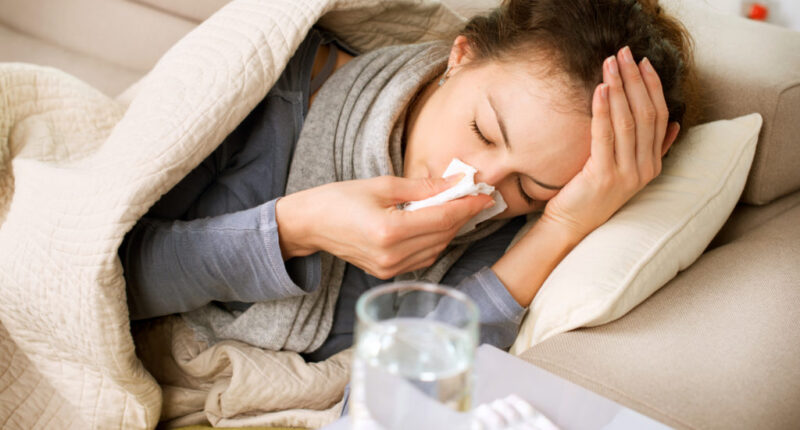5 Contagious Infections You Can Get Through Sharing a Pillow – Pillows provide us with comfort and support as we sleep, but they can also harbor germs, bacteria, and even parasites. Ensuring proper personal pillow hygiene is essential for preventing the spread of diseases. By keeping your pillow clean and refraining from sharing it with others, you can significantly reduce the risk of infection.

Table of Contents
#1: Influenza
Influenza, or the flu, is a highly contagious respiratory illness caused by influenza viruses. Sharing a pillow with an infected person increases your chances of contracting the flu. The virus can survive on surfaces and can easily be transmitted through close contact, including sharing a pillow. Symptoms of the flu include fever, body aches, cough, sore throat, and fatigue.
#2: Meningitis
Meningitis is an inflammation of the membranes surrounding the brain and spinal cord. It can be caused by various viruses and bacteria, some of which can be transmitted through close contact. Sharing a pillow with an individual carrying the bacteria responsible for meningitis puts you at risk. Symptoms include severe headaches, neck stiffness, fever, and sensitivity to light.
#3: Bed Bugs
Bed bugs are small insects that feed on human blood. They are commonly found in mattresses, pillows, and furniture. Sharing a pillow infested with bed bugs can lead to a bed bug infestation in your own home. These pests can cause itchy bites and have a negative impact on your sleep quality and overall well-being.
#4: Head Lice
Head lice are tiny parasites that infest the scalp and hair. They spread through direct head-to-head contact, but sharing a pillow with someone who has lice increases the risk of infestation. Head lice can cause intense itching and discomfort. They are more common in children but can affect individuals of any age.
#5: Tuberculosis
Tuberculosis (TB) is a bacterial infection that primarily affects the lungs. It can spread through the air when an infected person coughs, sneezes, or talks. While sharing a pillow alone may not lead to TB transmission, it can increase the likelihood of close contact with an infected individual. Symptoms of TB include persistent cough, chest pain, fatigue, and weight loss.
Conclusion
Sharing a pillow may seem like a harmless gesture, but it can expose you to various deadly diseases. Influenza, meningitis, bed bugs, head lice, and tuberculosis are just a few examples of the risks associated with this practice. To protect your health and well-being, it’s crucial to prioritize personal pillow hygiene and avoid sharing pillows with others.
Regularly cleaning and maintaining your own pillow, along with practicing good personal hygiene, can significantly reduce the risk of disease transmission. Remember to wash your pillowcases frequently, follow proper washing instructions for your pillow, and consider using a pillow protector to keep it clean and free from allergens and pests.
FAQs (Frequently Asked Questions)
While it’s generally recommended to avoid sharing pillows, there may be situations where it’s deemed safe. For example, sharing a pillow with your immediate family members who are in good health and practice good personal hygiene may carry minimal risk. However, it’s still best to err on the side of caution and prioritize individual pillows for better hygiene.
How often should I clean my pillow?
Cleaning frequency depends on the type of pillow you have. Most pillows can be washed every 3-6 months, while others may require more frequent cleaning. It’s essential to check the manufacturer’s instructions for your specific pillow. Additionally, using pillow protectors and regularly washing pillowcases can help maintain cleanliness and reduce the need for frequent washing.
Are there any alternatives to sharing a pillow?
Yes, there are alternatives that can provide comfort without the risks associated with sharing a pillow. Consider using separate pillows for each individual or opting for body pillows that can be shared while maintaining a certain degree of personal space. These alternatives help minimize direct contact and reduce the risk of disease transmission.
Can I get these diseases from other types of close contact?
Yes, close contact in general can increase the risk of disease transmission. Diseases like influenza, meningitis, and tuberculosis can be spread through close contact with an infected individual, not just limited to sharing a pillow. It’s important to practice good hygiene, maintain distance when someone is sick, and follow appropriate preventive measures to reduce the risk of contracting these diseases.
What are some additional tips for maintaining good personal hygiene?
In addition to avoiding the sharing of pillows, here are some general tips for maintaining good personal hygiene:
- Wash your hands regularly with soap and water.
- Cover your mouth and nose with a tissue or your elbow when coughing or sneezing.
- Avoid touching your face, especially your eyes, nose, and mouth.
- Clean and disinfect frequently touched surfaces.
- Practice good respiratory hygiene by maintaining distance from individuals who are coughing or sneezing.
- Stay up to date with vaccinations to protect against infectious diseases.
Remember, prioritizing personal hygiene and taking proactive measures can significantly reduce the risk of contracting deadly diseases and help maintain optimal health.
You may also like: 3 reasons to avoid energy drinks during your period









